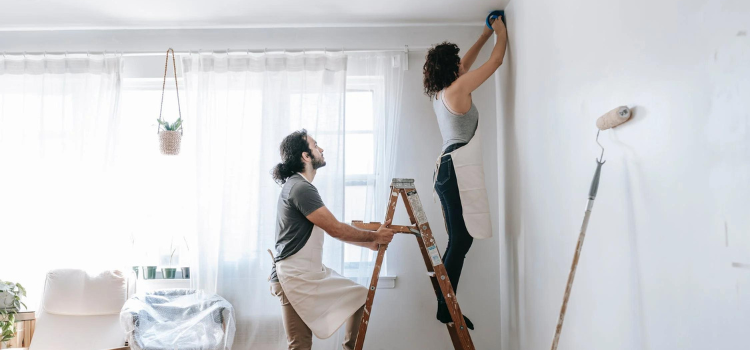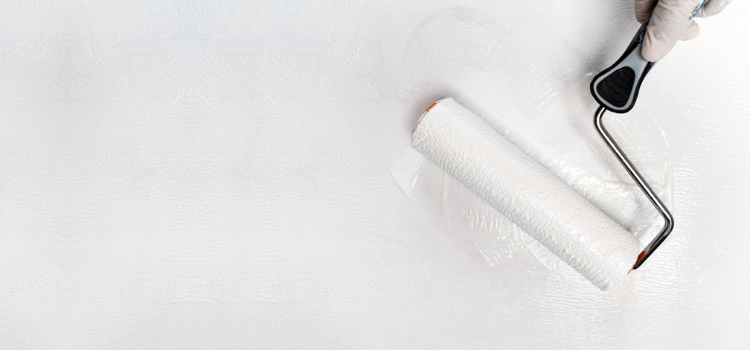Table of Contents:
Pro tips for achieving a perfect paint job
There's no doubt that a fresh coat of paint is one of many essential home improvements to add value To elevate your painting skills and create a flawless finish, consider these expert painter tips!
Article Summary
- Ideal Weather Conditions
- Furniture Protection
- Switch Plate Prep
- Brush Loading Technique
- Roller Efficiency and Storage
- Strategic Painting Order
- Invest in Quality Equipment
- Illuminate Your Workspace
- Sequential Wall Completion
- Flawless Surface Preparation
- FAQs
1. Ideal Weather Conditions
Optimal conditions for painting involve dry weather. Avoid rainy days, as high humidity can lead to dripping and slow drying times. If you need to paint in humid conditions, use slow-drying paint to correct mistakes before moving on to the next coat. Remember, patience is key to a flawless finish.
2. Furniture Protection
Safeguard your furniture by relocating it to the room's center. Cover it meticulously with taped plastic sheets to shield against paint drips, splatters, and dust from sanding. This proactive measure ensures a tidy and protected workspace.
3. Switch Plate Prep
Simplify the painting process by removing switch plates with a screwdriver. This eliminates the need for tedious taping or cutting around the plates, providing seamless coverage without any mess.
4. Brush Loading Technique
Adopt the 'load and go' approach used by professional painters. Load the bottom part of your brush with paint, tap off excess drips, and begin painting. Avoid the common 'load and dump' method, as it's not conducive to preserving brush health. Dunking brushes in paint and wiping off excess can compromise their efficiency.
5. Roller Efficiency and Storage
Utilise the effortless roll-off feature of modern roller paints. Apply minimal pressure using an extension pole to cover a larger area with ease and prevent back strain. When wrapping up for the day, soak the roller in paint and secure it in an airtight plastic bag for reuse. For longer breaks, carefully remove the roller without making a mess.
6. Strategic Painting Order
Achieve a professional finish by painting strategically from top to bottom. Start by cutting in the edges at the ceiling and baseboard with a brush. Then use a roller to spread paint downwards from the ceiling, covering any potential drips or splatters as you work your way down the wall.
7. Invest in Quality Equipment
Don't compromise on paint application tools, especially when using premium paint. Invest in effective brushes, roller covers, and high-end painter's tape to ensure optimal coverage and minimise the need for re-application.
8. Illuminate Your Workspace
Proper lighting is crucial for a flawless paint job. Avoid missing spots by investing in a work light. Regularly inspect your work, especially around edges where a brush is used. Fixing any overlooked areas while still on the job is much easier than addressing them after you've finished painting for the day.
9. Sequential Wall Completion
Opt for a seamless look by completing one wall entirely before moving on to the next. Professionals cut in one wall and immediately roll it to ensure a consistent appearance between brushed and rolled areas.
10. Flawless Surface Preparation
Achieve a smooth painting surface by thoroughly cleaning walls from baseboard to ceiling with a fine-grit sanding pole. Horizontal sanding along the baseboard and ceiling, without applying excessive pressure, prevents damage to the wall. Use a sanding sponge for intricate woodwork and crevices. This meticulous preparation is essential for a flawless finish.
If you need some extra help achieving the perfect paint job, get quotes from local painters today!
Get free quotes in minutes.
Get quotes from our qualified and licensed tradies Australia-wide.
FAQs
How do I choose the right paint for my project, and does the type of paint impact the painting process?
Selecting the appropriate paint is crucial for a successful project. Consider factors such as the type of surface, room usage, and desired finish. Whether you choose latex or oil-based paint can impact drying times, application techniques, and overall results.
What's the best way to clean and store painting equipment, such as brushes and rollers, for reuse?
Proper cleaning and storage of painting tools extend their lifespan. After use, clean brushes and rollers thoroughly with the appropriate solvent. For extended breaks, wrap them in airtight plastic or aluminium foil. This prevents drying and allows for easy reuse without compromising the quality of your tools.
Are there any eco-friendly alternatives or practices for a sustainable paint job?
Yes, for a more environmentally conscious approach, consider using low-VOC or zero-VOC paints. Additionally, opt for brushes and rollers made from recycled or sustainable materials. Proper disposal of paint cans and cleaning materials in an eco-friendly manner is also recommended.
Further Reading
- How to Cut and Install Drywall
- 7 Things You Can Do to Maintain the Look of Your House Paint
- A Guide to Colour Psychology in Home Decorating and Room Design

